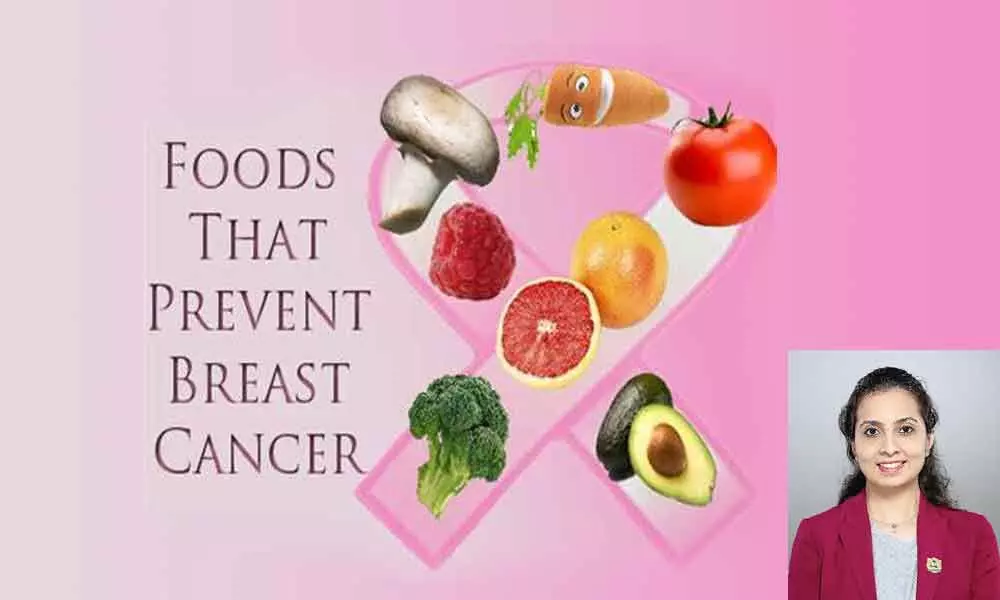Diet plan to prevent breast cancer, what to eat and avoid?

Diet plan to prevent breast cancer, what to eat and avoid?
Breast cancer is the most common type of cancer in women next to cervical and oral cancer in our country.
Breast cancer is the most common type of cancer in women next to cervical and oral cancer in our country. It accounts for 14% of cancers in Indian women. Despite being a treatable condition, due to the low rate of early detection many women have become a victim to this deadly disease. The chances of survival are higher if the condition is detected in time and given proper treatment. Evidence suggests a greater number of risk factors that cause breast tumours are linked to nutrition & lifestyle (obesity, eating pattern and alcohol consumption). A healthy diet and good nutrition are essential to reduce the incidence of breast cancer and the risk of breast cancer progression or recurrence.
Breast cancer cannot be prevented by eating healthy food or diet but it aids immune function which can significantly reduce the risk of developing breast cancer. A healthy weight can be maintained through diet which is also a key factor in preventing breast cancer. Moreover, in cancer patients eating proper nutritious food can help the body heal from the treatment, minimize the symptoms and its side effects. Hence, it is the right time for you to reevaluate your diet & lifestyle.
Your diet plan should have approximately 50% (or more) vegetables, 25% (or more) protein, and up to 25% or less of starchy vegetables or whole-grain as prescribed by your Dietitian.
Eat more fruits and plant-based diet: Try eating 1 or 2 fruits every day as a snack or dessert. A plant-based diet is highly recommended with dhals, sprouts, beans, unpolished cereals & millets.
Good fats are also known as monounsaturated fats and polyunsaturated fats are good for your heart, your cholesterol, and your overall health. Research has suggested that these healthy fats may inhibit the growth of breast tumours so do not exclude them. Good fats can be found in cold-water fish, chia seeds, flaxseeds, sunflower seeds, walnuts, olive oil, avocados, rice bran oil, nut or oilseed based oils to be consumed regularly. Limit the intake of highly saturated foods such as red meat, organ meat, cheese, sausages/processed meat, butter, ice cream. One should decrease foods containing trans-fatty acids, such as commercially prepared baked goods, packed snacks and use of hydrogenated fats such as vanaspati. Eat protein to prevent loss of muscle which is common in all types of cancer: Try including protein in every meal and as a part of your diet plan. Consume more poultry, fish and vegetarian proteins (legumes and lentils).
Add antioxidants & vitamins A, C, E, selenium to your diet. Some have chemo-preventive properties that contain phytonutrients, antiestrogenic that fights against the cancer-causing cells from multiplying further in the body, reduce oxidative stress, inflammation and changing the epigenome such as Carotenoids in dark yellow/orange/green vegetables and fruits, Lycopene in tomatoes, grapefruit, watermelon. Phenolic compounds, diallyl sulfides from garlic, green tea, onions, shallots, dark leafy veg, Glucosinolates, isothiocyanates, sulforaphane and indoles in cabbage, cauliflower, broccoli, mustard leaves, sprouts and
Curcumin from turmeric: Curcumin is the main active ingredient in turmeric and has powerful anti-inflammatory and antioxidant properties. Make sure you use turmeric in your daily cooking. Brazil nuts, seafood and Vitamin C containing foods like amla, kiwi, guava, capsicum are great sources for Selenium. Avoid food items such as refined flours, sugars, polished grains, pickled/processed foods, caffeine, regular consumption of smoked, charred, grilled foods and cooking at high temperature (>300-degree F). Also, limit the consumption of alcohol & quit smoking. Research suggests that alcohol consumption equivalent to 3–4 standard drinks or more per week is associated with the risk of breast cancer recurrence, particularly among postmenopausal and overweight/obese women who bring out specific epigenetic changes and interacts with the medicines. Foods mentioned in the above needs to be prescribed by the dietitian and anything excess or less always carries a risk.
(The author is a senior dietician, Aster CMI Hospital)








